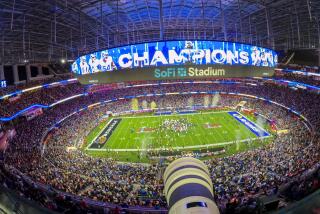Tampa Again Set for a Show
- Share via
TAMPA, Fla. — A Super Bowl in Tampa, a George Bush in the White House and trouble in the Middle East.
It might seem as if not much has changed in the decade since this city last played host to the Super Bowl. But take a closer look--many things are different.
When Super Bowl viewers last saw Tampa, the United States was at war and the pregame parties were canceled out of concerns of terrorism. There was a recession, so indulging in too many Super Bowl celebrations seemed in poor taste, anyway.
Ten years later, the party is on.
Tampa is celebrating a decade of turning itself from a hard-scrabble port town into a ritzy remake of its southern Florida cousins. Ybor City, the city’s once-dying Latin quarter, has been revived into an entertainment hot spot. The Super Bowl also presents a golden opportunity to feature a city that wants the 2012 Olympics.
Taxpayers have been tapped for the new Raymond James Stadium, Ice Palace and Florida Aquarium. Even the Tampa Bay Buccaneers have shed their unstylish Orange Crush-colored uniforms for a cooler red and pewter.
“This place is just getting better and better, and looking better and better,” said Mayor Dick Greco, well-known as Tampa’s biggest cheerleader. “Tampa has been discovered in the last several years by the entire world.”
This is Tampa’s third title game; its first was in 1984. Being the host for the Super Bowl almost seems routine, especially after the difficulties that came with the 1991 game.
A decade ago, Tampa police worried about terrorist attacks because of the Gulf War. Now traffic and public drunkenness top the list of concerns.
Bomb-sniffing dogs, metal detectors and about 300 off-duty law enforcement officers will be patrolling the game area.
“We don’t have a Gulf War to worry about or the exaggerated potential for terrorism to worry about,” said Tampa police officer K.C. Newcomb, who has headed security plans for the 1991 and 2001 games. “Things are a little less hectic.”
Still, Tampa is facing a double-whammy for officers and city crews.
On Saturday, Tampa will play host to Gasparilla, a rowdy annual Mardi Gras-like event in which the partying will go on all day and into the early morning of Super Bowl Sunday.
Few civic leaders will deny that Super Bowls have ever come easy to Tampa. So far the 2001 game is relatively trouble free, but it didn’t start out that way.
Tampa was awarded the Super Bowl after a hard-fought campaign to persuade city voters to approve a sales tax increase to pay for a new $168-million stadium.
The Super Bowl, along with a promise to keep the Buccaneers in Tampa, was dangled before voters. Former Mayor Bill Poe launched a bitter court fight to stop the measure and the use of tax money for the stadium.
In 1996, when Tampa didn’t get the 2000 game, Buccaneer owner Malcolm Glazer angrily accused the NFL of breaking its promise. Then, Tampa was abruptly awarded the game a year before bids from other cities were even taken.
As for economic impact, others in the community argue the city isn’t financially better off because of the 1991 game, and shouldn’t expect riches now.
Despite the big-money corporate sponsors who will be here, local economic experts predict only hotels and restaurants will see any kind of boom in the bottom line, said Philip Porter, a professor at the Center for Economic Policy Analysis at the University of South Florida.
During Tampa’s 1991 game, the county rang up $720.2 million in sales, about $14 million less than the average January then. The 1984 game posted about $9 million less in sales.
Porter, who testified on Poe’s behalf during the lawsuit against the stadium, said Super Bowls in the Sun Belt don’t help much because football fans merely replace other tourists that come here in January.
Cold northern cities do make money because they draw fans at a time when hotels otherwise would be empty, the studies show.
“There are other reasons to have a Super Bowl,” Porter said. “But the question is do you use public money for something that does not benefit everyone.”
None of that, though, will convince the mayor and Tampa’s Super Bowl backers otherwise.
Greco, who has guided the city’s renaissance during nearly six years in office, insists the international exposure of the Super Bowl will be invaluable to Tampa.
He said he’s debating whether to attend the game because he also wants to see how his city will play before a worldwide TV audience.
“I want to savor it,” he said.
More to Read
Go beyond the scoreboard
Get the latest on L.A.'s teams in the daily Sports Report newsletter.
You may occasionally receive promotional content from the Los Angeles Times.










